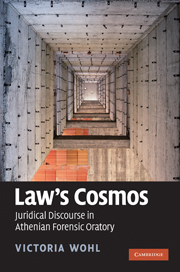Conclusion: the paradigmatic law
Published online by Cambridge University Press: 07 September 2010
Summary
Androcles of Pitthus, prosecuting a proposed law, was shouted at when he said “The laws need a law to set them right. Fish need salt, although it is neither probable nor plausible that they should since they grow up in salt water. Likewise, olive cakes need olive oil, although it is hard to believe that something that produces oil would need oil.”
Aristotle Rhetoric 1400a9–14Were one forced to offer a conclusion as to the significance of the legal tradition, it would be in terms of a system of transmission, of messages and so of texts, specialised writing systems or structures of notation. Were one to build a critique of that tradition of transmission, then it would have to start with the question of texts and of the linguistics of legal texts.
Goodrich 1990a: 110Being taught with many examples (paradeigmata) makes your verdict easy.
Lycurgus Against Leocrates 124LAW, CODE
Modern jurisprudence is characterized by an ideal of systematicity: it aims at (even if it necessarily fails to achieve) completeness, unity, consistency, and stability. Since the compilation of the Justinian Corpus Iuris Civilis in sixth-century ce Rome, these goals have been attached to the idea of a written code, and a written code has in turn been seen as the essence of the law. The commitment to codification has been particularly strong in the civil law tradition that traces its origins to the Corpus Iuris Civilis, but common law, too, is predicated on the notion of a legal code, though one that takes the form not of a single authoritative text but of a historical accretion of decisions in individual cases.
- Type
- Chapter
- Information
- Law's CosmosJuridical Discourse in Athenian Forensic Oratory, pp. 287 - 316Publisher: Cambridge University PressPrint publication year: 2010



